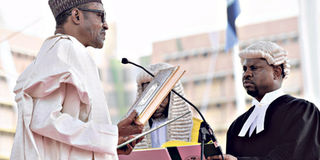Nigerians bank on Buhari for change as he takes over the reins of power

Nigerian President Mohammadu Buhari takes the oath of office at the Eagles Square in Abuja on May 29, 2015. AFP
What you need to know:
- Mr Buhari enjoys huge support from the north. The people of this region see him as the leader who can deliver them from the marginalisation they have been subjected to.
- He cited the crisis in the Niger Delta, Boko Haram, problems in the power sector and unemployment among the youth as key challenges that confront his government.
- Mr Buhari is a man who will keep the nation guessing, of course within protocol limits, but excesses will be far from his administration.
Sai Buhari! Sai Baba! chants rent the air as Nigeria swore in a new president in a ceremony devoid of much fanfare and gallantry.
At 10.45am, Nigerian time, Mr Muhammadu Buhari took the oath of office in Abuja to become the country’s fifth president. He is holding the title for the second time.
However, this time, he will be serving as a civilian head of state. He served as a military head of state from December 1983 to August 1985.
A few minutes earlier, Prof Yemi Osibanjo had taken the oath of office as the vice-president. It is the first time for Nigeria to have a lawyer for a deputy president.
Mr Buhari may not have been everyone’s choice about two months ago, but that does not matter. Today, he begins a journey of presiding over the leadership of Africa’s largest nation and economy, with all the goodwill the Nigerians can give him.
In the last few weeks, Nigeria has witnessed challenges from a prolonged oil strike that led to a near shutdown of the economy. Power generation is at an-all time low and almost all the state agencies are in debt, but the country is optimistic.
The citizens have high expectations. Many recently declared: “Wait until Buhari comes in. He will fix NEPA (the country’s electricity generating company).”
HUGE SUPPORT FROM THE NORTH
Mr Buhari enjoys huge support from the north. The people of this region see him as the leader who can deliver them from the marginalisation they have been subjected to.
It is understandable why expectations are high. During campaigns, the All Progressives Congress promised to restore order within 100 days of office. It could be easier said than done. The last few weeks have been an apt mirror of the crisis the country is facing in critical sectors. This is a wake-up call for the new government.
But Mr Buhari is not your usual president. In his first address, he declared that he belongs to everybody and not anybody. He also promised to keep his oath of office.
He cited the crisis in the Niger Delta, Boko Haram, problems in the power sector and unemployment among the youth as key challenges that confront his government.
The leader has the gift of hindsight from his days as head of state back in the 80s.
The methods may not be the same, but he knows the protocols of government and some of the challenges that come with it.
He also once served as the federal minister for petroleum resources. The experience will come in handy as he seeks to restore sanity in the industry.
Secondly, he comes across as one who is frugal and does not tolerate excesses.
Mr Buhari leads a humble life, unlike many former leaders of the country.
On Tuesday, he arrived from London and casually walked across the Abuja airport lobby without his close aides.
Mr Buhari is a man who will keep the nation guessing, of course within protocol limits, but excesses will be far from his administration.
His administration, will, however, not have it easy. Nigerians are demanding a change from the past and they need it now.
The country’s civil society is pushing Nigerians to remain accountable.
In the morning of the inauguration, BudgIT, a technological civil society outfit, organised a discussion on Twitter on the subject “Who is an #ActiveCitizen”. The responses were wide and varied. They went beyond demanding good governance but actually participating in it.
SOCIAL MEDIA
Gbenga Sesan, a social entrepreneur and ICT consultant, tweeted: “With social media, it’s easier for an #ActiveCitizen to track government promises so we hold them to account. We’re the new ‘opposition’.”
Indeed, social media is the new opposition.
Mr Buhari cited social media as a key influence in getting him to power but appealed to those using it to be responsible and patriotic when using it.
His government will have to deal with a generation that goes beyond simply prostrating respectfully at elders to demanding accountability through the very platform that helped it ascend to power.
Nigeria has received a new beginning, one full of hope for change that goes beyond Abuja. Hopefully, it will be one where citizens will take their place in doing what is right for Nigeria.



